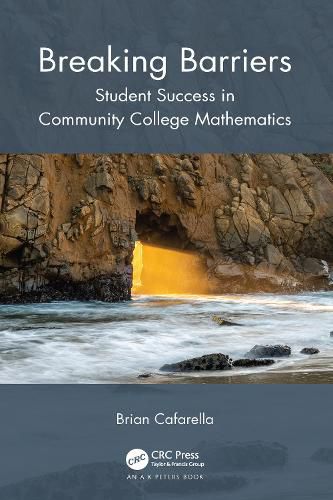Readings Newsletter
Become a Readings Member to make your shopping experience even easier.
Sign in or sign up for free!
You’re not far away from qualifying for FREE standard shipping within Australia
You’ve qualified for FREE standard shipping within Australia
The cart is loading…






The fact college students often struggle in mathematics is not new. They exhibit a great deal of anxiety, dislike, and overall disinterest. Quantitative data displaying abysmal student success rates are widely available and shared.
This book explores the complexity surrounding the issue of student difficulties in community college math. Though much quantitative research focuses on the faculty experiences and perspectives regarding methods and practices, the author puts the focus on students’ experiences.
The book presents the results of a study focused on students who struggled in mathematics. Though their experiences varied, they all entered community college with a great deal of disgust and anxiety toward mathematics courses and requirements. These impressions and attitudes create barriers to success. However, all the students eventually succeeded in fulfilling their college-level mathematics requirement.
The author presents these students’ experiences prior to entering community college, what led to both success and failure in their math courses, and the common themes leading to success and failure. Through these student responses, the author assists readers in gaining a better understanding of the community college student who struggles in math and how to break students’ community college math barriers to success.
TABLE OF CONTENTS
Preface
Math is a Four-Letter Word
The Framework for Developmental and Introductory College-Level Math
3.The Study, Settings, and the Participants
Prior Experiences in Math
Attempting Math and Community College
Navigating the First Developmental Math Course
Math Pathways and Completing Developmental Math
The End of the Rainbow
9 I Need More Math…Now What?
Appendix A: Analyzing the Results and Ensuring Accuracy
Appendix B: Pre-Algebra and Introduction to Algebra Course Content
Appendix C: Stand-Alone Quantway 1 and Statway 1 Course Content
Appendix D: Elementary Algebra (all half semester) Content
Appendix E: Intermediate Algebra Content
Appendix F: Lead Questions for Student Participants
Appendix G: Lead Questions for the Lester Community College Faculty
Index
BIOGRAPHY
With 21 years of experience in mathematics education and 17 years as a community college math professor, the author has instructed courses from developmental math through calculus. He has served as Chair of the Developmental Math Department and Assistant Chair of the Mathematics Department at Sinclair College, Dayton, Ohio. He received the Jon and Suanne Roueche Award for Teaching Excellence and the Ohio Magazine Excellence in Education Award. His published research focuses on faculty viewpoints regarding pedagogical practices as well as conceptual research concentrating on developmental math. His article, Acceleration and Compression in Developmental Math: Faculty Viewpoints, was awarded Article of the Year by the Journal of Developmental Education.
$9.00 standard shipping within Australia
FREE standard shipping within Australia for orders over $100.00
Express & International shipping calculated at checkout
The fact college students often struggle in mathematics is not new. They exhibit a great deal of anxiety, dislike, and overall disinterest. Quantitative data displaying abysmal student success rates are widely available and shared.
This book explores the complexity surrounding the issue of student difficulties in community college math. Though much quantitative research focuses on the faculty experiences and perspectives regarding methods and practices, the author puts the focus on students’ experiences.
The book presents the results of a study focused on students who struggled in mathematics. Though their experiences varied, they all entered community college with a great deal of disgust and anxiety toward mathematics courses and requirements. These impressions and attitudes create barriers to success. However, all the students eventually succeeded in fulfilling their college-level mathematics requirement.
The author presents these students’ experiences prior to entering community college, what led to both success and failure in their math courses, and the common themes leading to success and failure. Through these student responses, the author assists readers in gaining a better understanding of the community college student who struggles in math and how to break students’ community college math barriers to success.
TABLE OF CONTENTS
Preface
Math is a Four-Letter Word
The Framework for Developmental and Introductory College-Level Math
3.The Study, Settings, and the Participants
Prior Experiences in Math
Attempting Math and Community College
Navigating the First Developmental Math Course
Math Pathways and Completing Developmental Math
The End of the Rainbow
9 I Need More Math…Now What?
Appendix A: Analyzing the Results and Ensuring Accuracy
Appendix B: Pre-Algebra and Introduction to Algebra Course Content
Appendix C: Stand-Alone Quantway 1 and Statway 1 Course Content
Appendix D: Elementary Algebra (all half semester) Content
Appendix E: Intermediate Algebra Content
Appendix F: Lead Questions for Student Participants
Appendix G: Lead Questions for the Lester Community College Faculty
Index
BIOGRAPHY
With 21 years of experience in mathematics education and 17 years as a community college math professor, the author has instructed courses from developmental math through calculus. He has served as Chair of the Developmental Math Department and Assistant Chair of the Mathematics Department at Sinclair College, Dayton, Ohio. He received the Jon and Suanne Roueche Award for Teaching Excellence and the Ohio Magazine Excellence in Education Award. His published research focuses on faculty viewpoints regarding pedagogical practices as well as conceptual research concentrating on developmental math. His article, Acceleration and Compression in Developmental Math: Faculty Viewpoints, was awarded Article of the Year by the Journal of Developmental Education.